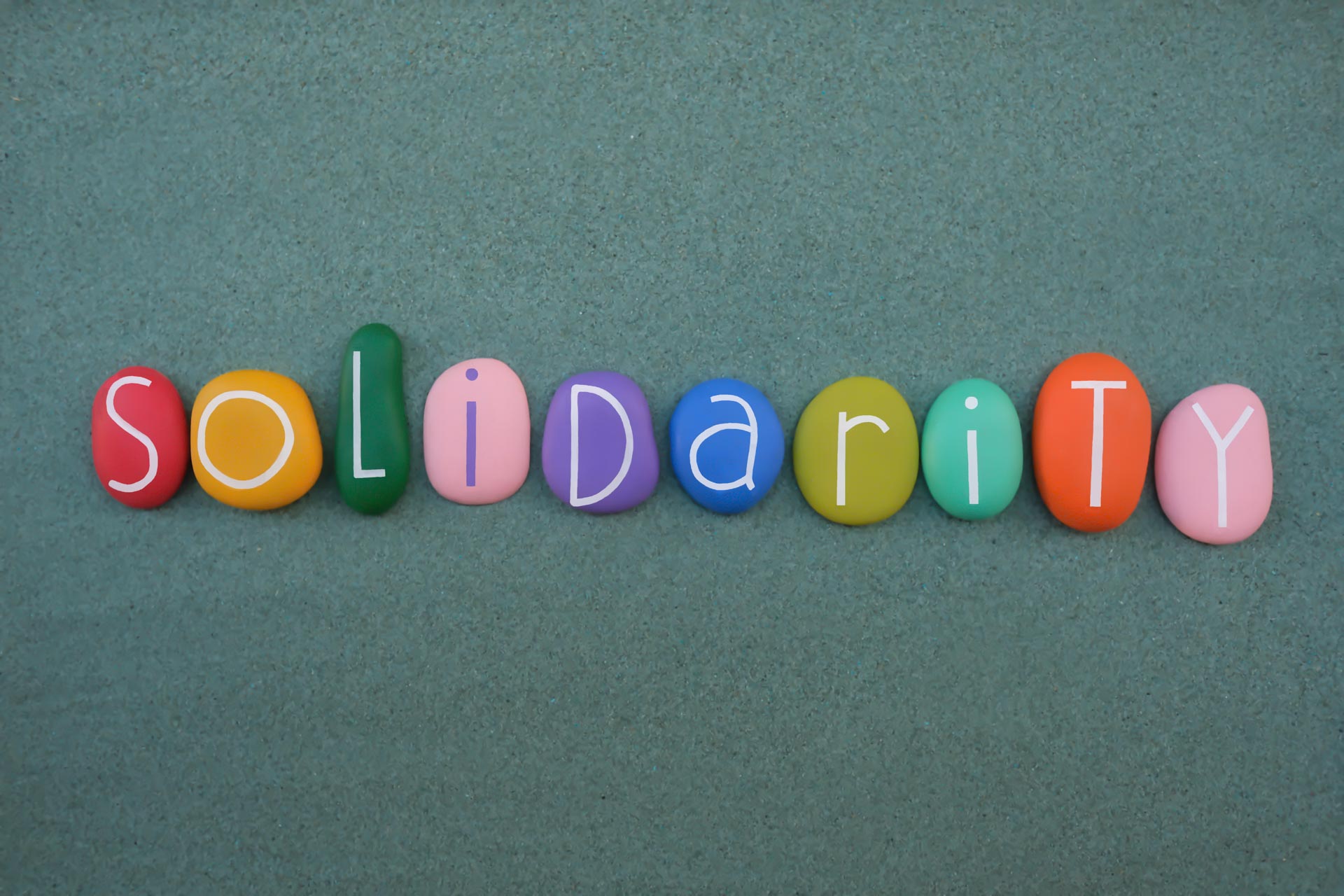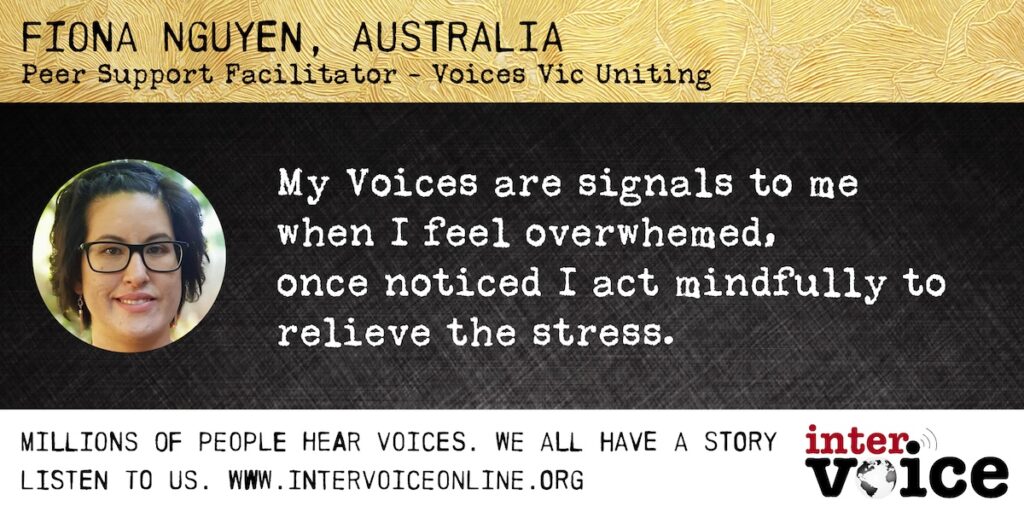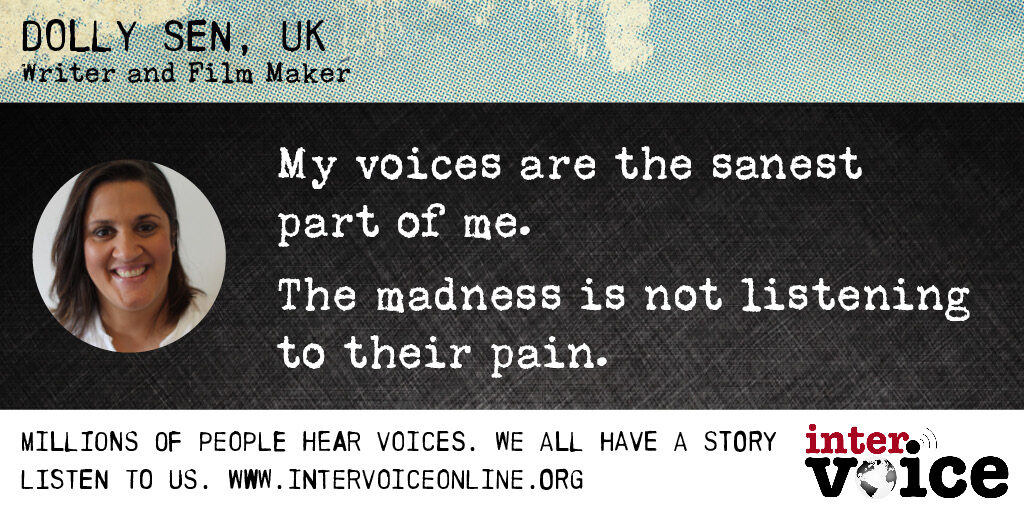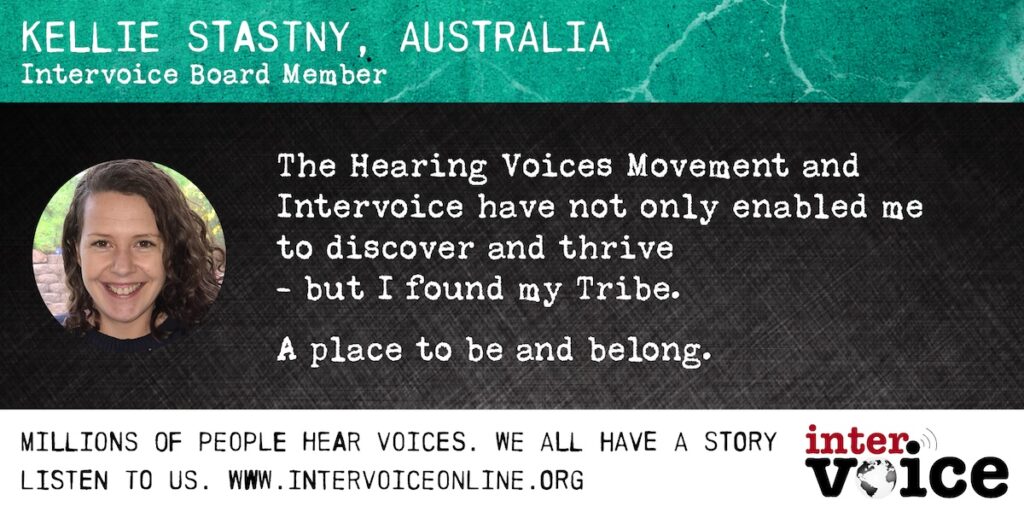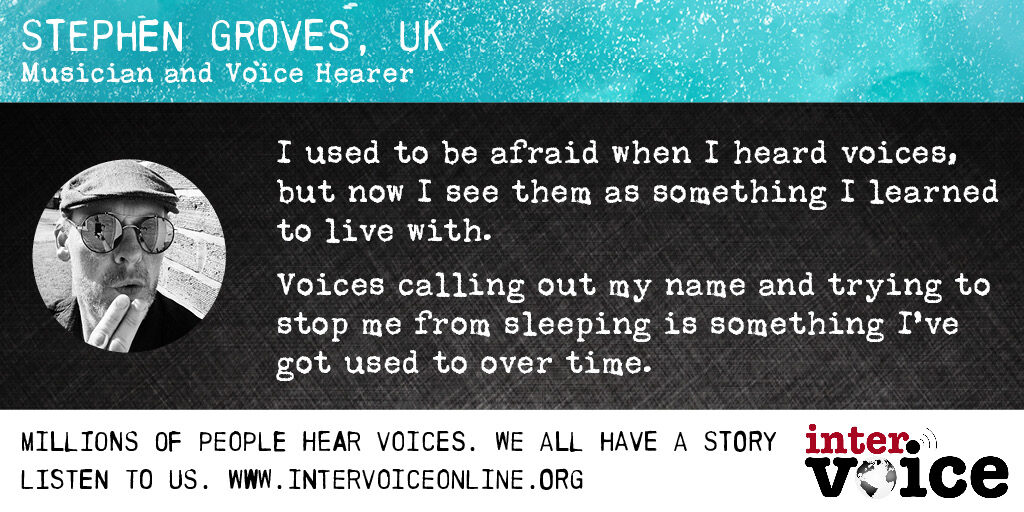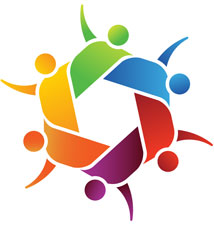 Our AGM is taking place on 21 November at 6pm at The Healing Room, Melbourne Convention and Exhibition Centre, Melbourne, Victoria, Australia (at the World Hearing Voices Congress).
Our AGM is taking place on 21 November at 6pm at The Healing Room, Melbourne Convention and Exhibition Centre, Melbourne, Victoria, Australia (at the World Hearing Voices Congress).
We are pleased to announce that we have received 10 nominations for 8 available places on the board. If you are a full member of Intervoice, you have the right to vote for up to 8 nominees either in person (if you are able to attend the AGM) or by submitting a proxy vote form (if you’re unable to attend in person).
The deadline for proxy votes is 19 November so, if you are a full member of Intervoice and haven’t received information about the elections yet please email us at [email protected] so we can rectify the situation.
Ten people are standing for election or re-election as Board Members and there are eight places available. Full members can vote for a maximum of eight board members (and proxy forms that exceed 8 votes will not be counted).
Full members will be added to a google email discussion list in order to ask the nominees questions and make an informed choice about who to vote for.
For more information, see: AGM & Board Membership and 2013 AGM & Elections.
To join Intervoice as a full member and gain the right to vote, see: Join Us.
Nomination Statements
We asked all nominees to contribute a short statement in support of their wish to be elected on to the board. We hope you will use these to inform your discussion on the election discussion list and your eventual choice.
- Philip Benjamin
- Kellie Comans
- Dirk Corstens
- Jørn Eriksen
- Sandra Escher
- Will Hall
- John Jenkins
- Eleanor Longden
- Olga Runciman
- Carla
Philip Benjamin
I have been a passionate advocate of the Hearing Voices approach for many years and was able to attend all the World Congresses apart from Cardiff, where I have found many kindred spirits and friends. Through my passion for advocating for a genuine human approach to voices among my colleagues (I work as a mental health nurse) from many professions, I have been working to establish a branch of the ISPS in Australia, which will culminate in its first AGM at WHVC in Melbourne, and have been able to contribute in a limited way (from 2000 Km away, via Skype), as I am on the WHVC 2013 clinical experts and advisory committees.
I know and count as friends many of the people associated with organising events and coordinating Intervoice, and I am definitely a team player, so as a board member I would be able to work more closely with them. I have recently been more and more involved in the Dialogical Practices movement, and would be keen to explore links between the various forms of dialogical practices emerging and being adopted within the recovery and early intervention approaches – it seems to me that these practices could form a bridge between the so far separate, and in some ways, competing, approaches for newly emerging voices and psychosis and recovery for those struggling with voices, psychosis and the effects of institutional ‘care’ – abuse, invalidation, stigma and low expectations.
In my day-to-day work as a mental health nurse I regularly work with my clients on their distressing voices, linking them in with resources such as intervoice.org, and I actively inform my colleagues about our service users voice hearing experiences and have some success – so far – in convincing them of the importance of this work. I think this education could be more significant impact in my own service and more widely in Australia if I am able to obtain a position on the Intervoice board.
While I live in Australia, I have been travelling to the UK and Europe regularly in recent years to participate in conferences, site visits and special training events, and while I would normally expect to continue this practice, I am sure that membership of the Intervoice Board would ensure that I will continue to make these journeys, and if not actually in Europe, I am keen to participate in meetings via teleconference at other times.
Kellie Comans
My desire and want to remain as part of the IHVP committee comes from a deep seated dedication and wish to be an integral part of a movement that’s actively trying to make genuine change and providing hope to so many voice hearers, professionals and allies.
I want to give back to the movement and people who have been one of the driving forces behind my Recovery/Discovery journey. People who validated a very real experience, who shared so openly and honestly how they had made sense and moved on to lead meaningful and enriching lives.
The HOPE this provided me with is indescribable and has changed every aspect of my life. I hope I can continue to be a part of providing such hope to others, to continue to challenge perpetuating myths and stigmas and to offer people an alternative to understand their own human experiences.
To have had the privilege to be part of such a learned, wise and committed board has been an honor. I want to continue to learn from these incredible individuals and for myself to continue to grown and learn how I can best be of service and support to the board, Intervoice and the Hearing Voices Movement.
I believe I have a lot to offer the IHVP committee with my lived experience, passion and my dedication and commitment to the movement.
Dirk Corstens
How I envisage Intervoice
For me Intervoice is as a family. Whenever I am at international hearing voices conferences I feel connected and touched by the attending people and their stories. It gives me energy, and I can see that other people feel connected – feel safe. In daily practice I still see how often voice hearers are misunderstood and mistreated. I see Intervoice as an organisation that supports the emancipation of voice hearers: empowerment, inclusion, exchange, sharing, fighting for human rights, taking responsibility. Intervoice connects voice hearers and their allies. The ethics of Intervoice should become standard everywhere.
What I personally want to achieve in the board of Intervoice
Intervoice is NOT a business and must not want to be. The board is a gathering of creative people that want to change the world. A bunch of people who practice what they preach: respect and passion. Personally I have four priorities: young people, new countries, training and research. I take responsibility for these issues and do what I can to promote them.
How I see the future board
We have a competent board and a good balance of experts. Personally I find it important that the majority of the board – together with the advisors – are voice hearers. I advise you to vote for the members of the present board. The Intervoice Board needs people like John Jenkins and Jørn Eriksen – who, as professionals, are passionate to change psychiatric practice. I am also glad that we have the support of Mind in Camden who help us with the running of the charity.
Bio
Presently I am the chair of the Intervoice Board. Since 1992 I have been active as a worker with voice hearers and in doing research on the subject. With Eleanor Longden and Rufus May I published ‘Talking with Voices’; with Eleanor Longden, Marius Romme and Sandra Escher ‘Voice hearing in a Biographical Context’ and with Eleanor Longden ‘The Origins of Voices’; all in the peer-reviewed journal Psychosis. I was co-author of ‘Living with Voices, 50 recovery stories’ with Marius Romme, Sandra Escher, Jacqui Dillon and Mervyn Morris. Together with Michel Knols I wrote ‘Tuning in” in Mental Health Today. I have been a speaker at numerous conferences and active as a trainer for Working to Recovery with Ron Coleman and Eleanor Longden on several occasions in many countries. Almost annually I am the trainer on a working with voices courses in Denmark. I work as a social psychiatrist and psychotherapist at RIAGG Maastricht in Maastricht, the Netherlands, where I also work with voice hearers.
Jørn Eriksen
The Hearing Voices Network was my professional turning point, which I am deeply grateful for. Everything I have done since then has built on this “belief system” and, if Intervoice can use my skills in any way, I’ll help with pleasure.
My views on Intervoice
The Hearing Voices Movement is strong and will go from strength to strength, internationally, as its ‘message’ is so clearly right, logical and understandable. The movement is driven by enthusiastic from all over the world, each taking this message to heart and spreading it further through their personal stories and their professional efforts. I therefore believe that Intervoice’s main task is to support this natural process, giving it the best possible growing conditions.
Intervoice can support this by: Sharing knowledge and information through its website, Facebook and Twitter. Connecting people, so that knowledge and experience spread worldwide. Providing support and legitimacy to voice-hearers and projects around the world, enabling them to build resilience and strength by being part of a distinguished international network. Working strategically to support the development of Hearing Voices Networks in all countries.
As a current member of the Intervoice, I am working to: Establish an offer for all current and emerging Hearing Voices Networks where the Intervoice Board will offer a conference about voice-hearing in return for reimbursement of their travel expenses only, supporting local networks whilst enabling the board to come together to meet in person. Establish an annual gathering in Europe where network members can meet and exchange experiences and develop ideas.
About me:
My greatest skills are that I’m a visionary and am good at making things happen. I have worked in psychiatry for 26 years and, since 1998, have pioneered work in Denmark around ‘recovery’ and ‘hearing voices’. I took the initiative to set up the Danish Hearing Voices Network and have been a member of the Intervoice board since 2010. In the last 15 years, I have organised numerous conference and events around hearing voices and recovery. I also run a publishing company that translates books about hearing voices and recovery into Danish.
I have led mental health services in the Lyngby municipality for the past 10 years, which is recognised in Denmark and Europe for its recovery-oriented work. I advise members of the Danish Parliament and am a board member of the International Mental Health Collaborating Network.
Sandra Escher
How I envisage Intervoice
I think the most important goals of Intervoice are:
- to connect people via the website, newsletter and congresses:
- to support young people
- to stimulate voice hearers to participate as partners in mental health care and research.
- to stimulate the hope that recovery is possible.
What I personally want to achieve in the board of Intervoice
I want to connect people, promote interest in child and young voice hearers and collect narratives. As a co-founder of Intervoice I know and am known by many people, receiving many emails seeking advice or connection to networks. This year I became an honorary member of the French network at the founding congress, I was involved in the start of the Belgian French speaking network, connecting them to the French and Canadian networks. In November I will promote Intervoice at the annual course on schizophrenia in Madrid. I am also gathering information about self-help groups, therapies and therapists.
Bio
As a committee member I have helped to organise 8 Intervoice Congresses. I have always been an intermediate between voice hearers and professionals. Believing in the power of voice hearers I have developed training to enable them to use their experiences as a tool for themselves and professionals in the recovery process.
I wrote several books with Marius Romme, translated into several languages, based on the experiences of voice hearers. I was co- author of ‘Living with voices’.
I was involved in developing the Maastricht interview as a tool for professionals and voice hearers to make sense of voices and relate them to their personal life history. The interview consists of: the interview, the report from the interview and the ‘construct’, which indicates a possible relationship between voices and life history. Currently Eleanor Longden and Dirk Corstens are conducting research proving the value of this.
In 2004 I got my M.Phil and my PhD with a 3-year follow-up study on 80 children hearing voices. I wrote an educational book for children and parents that has been translated into English and German. In 2007 I participated in the Leonardo Da Vinci Project developing a module for voice hearers to train professionals. I am a trainer in the use of the Maastricht interview. I am an honorary research fellow at the City University of Birmingham and an editorial member of the magazine of Resonance, the ‘Klankspiegel’.
Will Hall
Will Hall, MA, DiplPW is a schizophrenia diagnosis survivor and a leader in the movement for psychiatric patient rights. Host of the FM program Madness Radio, Will’s Harm Reduction Guide to Coming Off Psychiatric Medications is translated in 7 languages and he has been featured widely in the media, including the New York Times and Newsweek. Will is a counselor and trainer who has worked in more than a dozen countries teaching new ways of living with voices, paranoia, suicidal feelings, mania, and other extreme experiences. He is founder and assistant Director of Portland Hearing Voices and co-founder of Freedom Center, which co-sponsors one of the first hearing voices groups in the US. A long time mediator and yoga practitioner, Will is dedicated to discovering new pathways to human liberation. www.willhall.net www.madnessradio.net, www.practicerecovery.com
“When I was growing up, I wanted to be a magician. Then I wanted to be a biologist, then I wanted to be a psychologist, then I wanted to be a community organizer, then I wanted to be a philosopher. Now I’m sort of all of them.”
– Interview with Will Hall in the Portland Mercury newspaper, June 2009.
John Jenkins
I am currently a Board Member and Treasurer of Intervoice.
I have over 40 years of experience in changing mental health services and institutional practices as a clinician, manager, policy maker, educator and consultant.
- General Manager in Devon Health Authority, developing the first community mental health service in the UK resulting in the closure of 3 psychiatric institutions.
- UK Department of Health, reviewing mental health policies and developing new services.
- Founder, Centre for Mental Health Services Development at Kings College, London. This was established by the Department of Health to assist the implementation of community mental health services.
- Director of Operations and Service Development at Northern Birmingham Mental Health Trust that pioneered the mental health community functional teams that became national policy.
- International Mental Health Collaborating Network (IMHCN), an International NGO. Promoting recovery oriented services and practices. Sharing good practice. I am the current President.
- Senior consultant with WHO in Kosovo, Albania and Macedonia and program manager for WHO in Palestine.
- Founder Director of the International Center for Recovery Action in Practice, Education and Research(ICRA)
- Consultancy and training on recovery for service users and the development of whole life-whole systems approaches to community development in the UK and other countries.
I firmly believe that we need to Change the Thinking, Change the Practice, Change the Systems in mental health if we are to challenge the institutional belief held by the public and many mental health professionals that people cannot recover and lead a meaningful life as full citizens.
The work of Intervoice in spreading the hearing voices movement and practices to more places in the world is a crucial way of helping to do this.
I am a passionate believer and advocate for hearing voices and I have introduced Intervoice and its work on hearing voices to many groups and organisations in different countries.
I am able to bring this national and international experience to my fulfill my role on the Intervoice Board in bringing the importance of hearing voices values, understanding, experience and practice to my various networks in the world.
I can also bring me experience to the Intervoice Board as a manager and board member that I have gained in many organisations.
Eleanor Longden
My perspectives on Intervoice
In the mental health world, there are groups which are seen as great psychotherapy organizations, or great medical organizations, or organizations excelling in research. To me Intervoice – and the Hearing Voices Movement (HVM) it represents – is a great humanitarian organization, reaching out across the world. The achievements the community has attained in the last 20 years are truly extraordinary, and serve as a constant reminder that empathy, fellowship, justice, and respect are more than just words, they are convictions and beliefs – and that beliefs can change the world. Intervoice members envisage and enact a society that understands and respects voice-hearing, supports the needs of those who hear voices, and which values them as full citizens. Thanks to their work, this type of society is not only possible but already on its way.
My Contributions to Intervoice
I’ve been involved with Intervoice since 2010, first as co-founder and coordinator of the Research Committee, and more recently as a Trustee – and given that I owe my own recovery to the HVM, it’s been a constant joy and privilege to give something back in return! At a personal level, I’ve promoted Intervoice’s work through a combination of research, writing, training and public speaking, and have always been proud to take every opportunity of celebrating our community. This recently included a presentation at the 2013 TED conference in front of 1,700 people, including Bill Gates, Al Gore, Ben Affleck and Bono, and which proved a great opportunity to introduce our perspectives to a more mainstream audience. I’m really looking forward to seeing Intervoice continue to flourish and grow, and am fully committed to contribute to its success in each and every way that I can.
About Me
I’m a voice hearer and psychiatric survivor, and this lived experience constantly informs and shapes my professional work. I’ve also been fortunate enough to collaborate and learn from some truly amazing people in the HVM, and in the last few years this has really fuelled and energised my vision for creating positive social and psychiatric change. In the past I’ve worked in mental health services, although now do full-time teaching and research as I prepare to complete my PhD. I have a real love of writing, and in the past have applied this in various platforms to promote the Intervoice ethos, including peer-reviewed journals, book chapters and magazines articles; including my own book ‘Learning From the Voices in my Head’ (TED Books, 2013).
Olga Runciman
Hi my name is Olga Runciman; I am the chair of the Danish Hearing Voices Network and am about to graduate as a psychologist. I am also a registered psychiatric nurse. As a network we have played an active role in building it to what it is today along with the other dedicated board members. This includes spreading the message that hearing voices and having other unusual experiences is not an illness but related to life experiences, are meaningful and are contextual. In fact Denmark has been one of the countries which has always been very well represented at the yearly Intervoice congresses because we have been so successful in spreading the concept of the hearing voices movement especially within community psychiatry.
I belong to the more critical end when it comes to psychiatry and work towards ending human rights abuses within psychiatry. This means working towards the removal of laws aimed specifically at those suffering distress as per the UN Special Rapporteur on Torture, Juan E Méndez (2013) “States should impose an absolute ban on all forced and non-consensual medical interventions against persons with disabilities, including the non-consensual administration of psychosurgery, electroshock and mind-altering drugs, for both long- and short- term application”. I also believe that the diagnosis of schizophrenia is a construct and the validity behind the diagnosis is not evidence based.
Another area that I personally work actively for is the role of medication of which many who are distressed and hear voices and end up being labelled schizophrenic are subjected to. It concerns me that the evidence surrounding psychiatric drugs is dubious at best and in fact the evidence suggests that neuroleptics are considerably more harmful than the “illness”. One of the areas I have focused on here in Denmark is the increased mortality that appears to be linked to neuroleptic use.
Both these areas are areas I have focused on here in Denmark and I believe I have to a shift in psychiatric practice.
I am therefore working towards a post-psychiatric era where psychiatry whose power structure, as we know it today no longer exists. Instead genuine choice is a given for those suffering distress be it hearing voices groups, therapy, soteria houses, or even psychiatry.
I look forward to discussing these and other topics in the ensuing Internet debate.
Carla
As a former Voice Hearer once diagnosed with Schizophrenia, I lead a very successful, happy and healthy life. With a B.A. in Psychology, I have worked in the health care field for a decade and am also an entrepreneur. I am and proudly represent Voice Hearers as the intelligent and valuable individuals we are.
Once deeply ashamed and fearful of stigma, I kept my medical history a dark secret. I now accept this part of myself and it has improved my health and happiness immensely. My beliefs and values are completely in line with Intervoice. I passionately support looking at new views of Voice Hearing, Voice Hearers and methods of treatment.
My mission with Intervoice is to help other Voice Hearers accept themselves and feel OK about their experiences. Feeling guilt and shame is not helpful and only adds to challenges for Voice Hearers. It is my belief that a huge catalyst for society and the media beginning to embrace new concepts about Voice Hearing is through Voice Hearers accepting themselves, and releasing guilt and shame about their experiences.
Fear and stigma of Voice Hearing is not only not necessary, it prevents more accurate understanding, progress and support in recovery. In 2013 it is time for everyone to recognize Voice Hearers as people experiencing a unique situation, who continue to possess wonderful qualities and abilities as every person does.
Thank you for considering my nomination. I look forward to continue to support our community and further the Intervoice movement.


